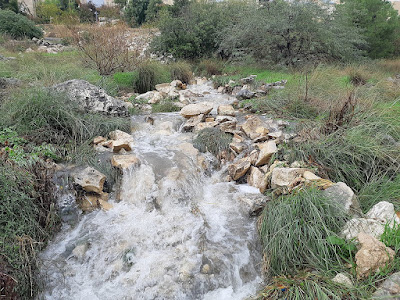by Hillel Fendel
The Yesha Council of Communities in Judea and Samaria reports that the sewage situation in Judea and Samaria (Yesha) is worsening, taking its toll not only on both Jewish and Arab residents of the areas, but also those in the Tel Aviv/Gush Dan region.
In the wake of the UN Climate Conference in Glasgow, the assumption is that even if Israel takes legislative steps to keep in step with the climate-change winds blowing across the world, these will not affect some of the worst polluters in the area: towns under the aegis of the Palestinian Authority (PA).
The strong current of the Modi'in Stream, for instance, which makes its peaceful way towards the city of Modi'in, not far from Ben Gurion International Airport, looks pastoral – but its stench is unbearable. This is because, as Gilad Ben-Ari, Director of the Shomron Ecology Department, explains, its waters are nothing more than raw, unpurified sewage straight from Ramallah, one of the largest cities in the PA.
"Collection and treatment of garbage from the PA cities simply does not take place," Ben-Ari says. "You can find dozens of fires every day, in which refuse from illegal quarries and much more is set ablaze, emitting black smoke, without any supervision. The air is being poisoned, and both Jews and Arabs alike are breathing it – and then it passes into pre-1967 Israel."
"This is basically a blow at our national security," Ben-Ari continues. "Air pollution in Israel kills approximately 2,000 people a year."
A resident of the Arab village Jam'in agrees with Ben-Ari's tone: "The dust here from the [illegal] quarry covers the olive trees and goes into our houses. It's very harmful."
Not all of Israeli law fully applies to Judea and Samaria, especially climate laws. "The municipalities cannot start working without the proper legal infrastructure," Ben-Ari notes, "such as the Clean Air Act… All that is needed is a decision to provide a few hundred million shekels a year, and this entire area can be fixed up and turned into a green area."
Back at the polluted brook near Modiin, Yesha Council Chairman Yigal Dilmoni says with clear agitation, "This sewage streams along and trickles into the mountain aquifer – from which water is drawn for the residents of Tel Aviv to drink! Judea and Samaria must be treated as part of the entire ecological challenge of our entire region."
Dilmoni submitted in 2019 a detailed proposal for dealing with the problems, including treatment of sewage, laws against pollution, and also an information campaign – but, for unexplained reasons, it became stuck at one of the bureaucratic levels.
Ecological issues are certainly not only Israel's alone – but Israel is poised to take its place among the world's leaders in finding solutions. 1,200 (!) Israeli climate companies took part in the Climate Innovation Conference in Israel earlier this month. "Israel can and must be among the world leaders in dealing with the climate crisis challenges," President Yitzchak Herzog said at the conference. "Our thousands of advanced start-ups and research institutions of international standards, and decades of experience in meeting environmental challenges, have already rendered us a world power in groundbreaking weather technologies."
